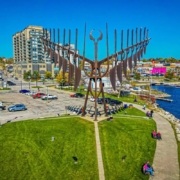Why Miami Airbnb Offers a Promising Investment Opportunity: A Holistic Examination
Miami: A Tapestry of Cultural and Natural Wonders
Miami is not just a city; it’s a melting pot of diverse cultures, languages, and traditions. Its rich Cuban, Haitian, Colombian, and various other Latin American influences provide a unique cultural vibrancy that’s palpable in its streets, cuisines, music, and festivals.
- World-class Beaches: Miami’s beaches, particularly the famed South Beach, are among the top-rated in the world. The allure of golden sands and turquoise waters is an undeniable magnet for tourists.
- Events and Festivals: From Art Basel to Miami Music Week and the Calle Ocho Festival, Miami hosts a plethora of events attracting global audiences.
- Culinary Delights: Miami’s food scene is a reflection of its multicultural tapestry. Whether it’s Cuban sandwiches, Haitian griot, or Colombian arepas, the city offers a culinary journey that resonates with global travelers.
- Architectural Marvels: The Art Deco Historic District, with its pastel-colored buildings and 1930s charm, is a UNESCO World Heritage site, drawing architecture enthusiasts from around the globe.

- Best Cities for Airbnb in USA: Top Big US Cities for Airbnb Investment
- A Comprehensive Guide on How to Start an Airbnb Business in Miami
- The Best Miami Beach Neighborhood for Airbnb Investment
- Miami’s Top Airbnb Neighborhoods: Guide for Mainland Miami
- From Homestead to Sunny Isles: Discover Miami-Dade’s Airbnb Investment Wonderland
- The Untapped Potential of Fort Lauderdale’s Airbnb Market
- Why Hollywood, Florida, is a Prime Location for Airbnb Investment
- Airbnb Guide to Exploring Miami
- Best Condos for Airbnb Investment in Miami
- Airbnb Management in Miami by MasterHost
Miami’s Real Estate Landscape
Beyond its cultural and natural appeal, Miami’s real estate market is a beacon for investors:
- Appreciation of Value: The average home value in Miami stands at $564,527, marking a 6.8% increase over the last year. This steady appreciation indicates a resilient market.
- Diverse Property Options: From luxury condos with ocean views in Brickell to charming Spanish-style homes in Coral Gables, Miami offers a variety of real estate options catering to different investment capacities.
- Infrastructure and Development: Miami’s continued focus on infrastructure development, including public transportation and roadways, adds to its real estate appeal.
Education and Research Institutions
Miami is home to some esteemed educational institutions like the University of Miami, Florida International University, and Miami Dade College. Their presence ensures a steady influx of students, researchers, and educators, adding another dimension to the city’s rental market.
Business and Economy
- PortMiami: Recognized as the “Cruise Capital of the World,” PortMiami adds significant value to the city’s economy.
- Financial District: Brickell, Miami’s financial district, hosts numerous international banks and financial institutions, drawing professionals from across the world.
- Tech Boom: In recent years, Miami has been emerging as a tech hub, with many startups and tech giants considering it a viable alternative to Silicon Valley.
Explore Modifying Your Airbnb Property for Digital Nomads.
Understanding Miami’s Airbnb Financial Landscape
To truly gauge the investment potential of Miami’s Airbnb market, a thorough examination of its key metrics is crucial:
- Average Daily Rate (ADR): Standing at $287.7, Miami’s ADR is a testament to its allure. This rate surpasses many major cities, highlighting the premium nature of Miami’s offerings.
- Peak Performance in March: March’s Daily Rate peaks at $330.3, with a record 72% occupancy. This suggests a seasonal surge, likely attributed to spring breaks and festivals, emphasizing the importance of capitalizing on peak months.
- Steady Occupancy Rates: An average occupancy rate of 58% is significant, especially when coupled with the vast number of available listings (14,480). It underscores the consistent demand for Miami Airbnb properties.
- Revenue Indicators: The average annual revenue for Miami Airbnb listings is a staggering $61.2K. Even more impressive is the peak monthly revenue in March, hitting $6,000. Such figures indicate a thriving market with substantial earning potential.
- Revenue Per Available Room (RevPAR): At $174.2, and with a weekend spike of $319.7, Miami’s RevPAR metrics are strong indicators of both the city’s appeal and the profitability of its Airbnb listings.
- Market Score: A score of 61 signifies a healthy market, ripe for investment. This metric, in tandem with others, paints a picture of a city that’s both popular and profitable.
The Secret Sauce to Skyrocketing Your Airbnb Profits in Miami

The Community Advantage
Potential investors and hosts in Miami benefit from a robust Airbnb community. This collaborative spirit fostered through local forums and groups ensure a support system, aiding in navigating regulatory landscapes, sharing best practices, and optimizing listing performances.
The Essential Calendar: Miami Key Dates Every Airbnb Host Should Know
Conclusion
Miami stands as a promising investment opportunity in the Airbnb domain, shaped by its rich cultural tapestry, world-class attractions, and robust real estate market. Its beaches, events, culinary delights, and architectural wonders make it a global tourist magnet. The city’s thriving real estate, bolstered by impressive appreciation rates and diverse property options, offers investors a dual avenue for returns. Further, Miami’s educational institutions and growing business sectors ensure a steady influx of both short-term and long-term renters. The city’s Airbnb financial metrics underscore its profitability, while a supportive hosting community paves the way for seamless operations. Collectively, these elements solidify Miami’s position as a premier Airbnb investment destination.
Read also:
- Why Investing in Los Angeles Airbnb Market is a Wise Choice
- The Wisdom Behind Investing in Atlanta’s Airbnb Market
- The Unprecedented Rise of Airbnb Investments in Austin
- The Unveiled Potential of Airbnb Investments in Houston
- Why San Diego is the Golden Ticket for Airbnb Investments
- The Top 5 Reasons Kissimmee is a Must for Airbnb Entrepreneurs
- Discover the Financial Oasis: Investing in an Orlando Airbnb
- Unlocking the Potential: Why Investing in the Tampa Airbnb Market Is a Smart Move
- Main Reasons for Saint Petersburg, Florida, Airbnb Investment
- Main Reasons Why Airbnb in Marco Island is a Great Investment
- Why Destin’s Airbnb Market is Booming
- Vero Beach Airbnb: The Smart Investor’s Secret to Seaside Success












